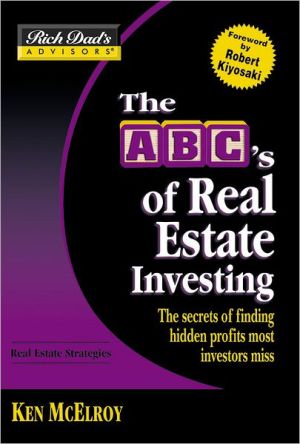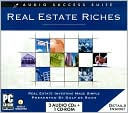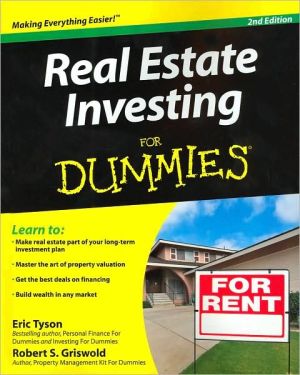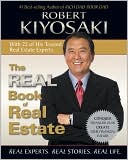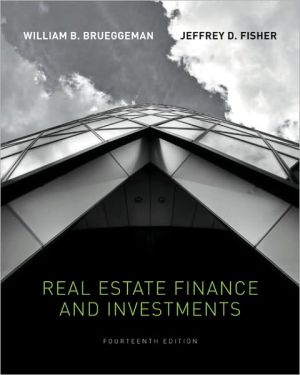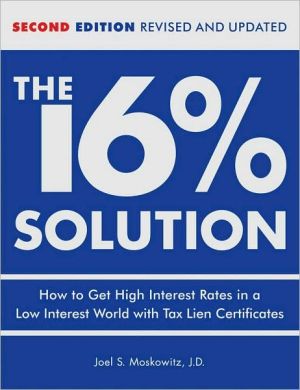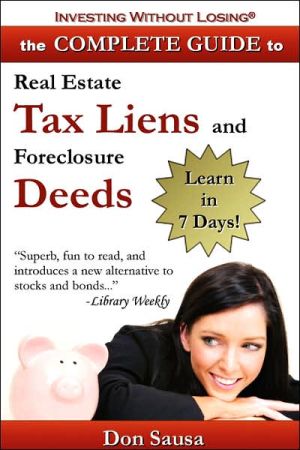The ABC's of Real Estate Investing: The Secrets of Finding Hidden Profits Most Investors Miss (Rich Dad's Advisors Series)
Want to get rich through real estate? Then you need The ABC's of Real Estate Investing. It's the definitive guide that will teach you how to find property, evaluate its worth, negotiate the deal and make money in the process. There are no 'get rich quick' tricks on these pages, just proven methods that deliver bottom-line profits and increased property values. -Ken McElroy, Real Estate Investor, Property Management Expert, Business Owner, and Author The ABC's of Real Estate Investing will:\ •...
Search in google:
Want to get rich through real estate? Then you need The ABC's of Real Estate Investing. It's the definitive guide that will teach you how to find property, evaluate its worth, negotiate the deal and make money in the process. There are no 'get rich quick' tricks on these pages, just proven methods that deliver bottom-line profits and increased property values. -Ken McElroy, Real Estate Investor, Property Management Expert, Business Owner, and Author The ABC's of Real Estate Investing will: • Achieve wealth and cash flow through real estate • Overcome the myths that are holding you back • Find property with real profit potential • Evaluate a property and set your own purchase price • Negotiate the deal based on the numbers • Discover hidden profits in the properties you buy or own • Increase your income through proven property management techniques.
Rich Dad's Advisors The ABC's of Real Estate Investing\ \ By Ken McElroy \ Warner Books\ Copyright © 2004 Ken McElroy\ All right reserved.\ ISBN: 0-446-69184-4 \ \ \ Chapter One\ The Myths and the Magic \ In every business and every industry there are people who just seem to drip with success. They seem to know all the right people, make all the right decisions, be in all the right places at exactly the right time. They seem destined for success whether they even try or not. Real estate investing is no different. In every city or town, there seem to be real estate tycoons that struck it rich through real estate.\ These are the people who just make success look easy. They appear confident, knowledgeable, savvy, and seem to see opportunities where others don't. It's easy for onlookers to think the achievements of these golden few are the result of luck or some sort of magic. But magic and luck have absolutely nothing to do with it. About fifteen years ago, I decided I was going to be one of the people I just described. I was going to make my own success, be my own boss, and achieve financial freedom. And I chose property management as my route. Call it instinct, call it impatience, call it burning desire. I wasn't about to wait for a lucky break or a magic charm. I set out to make my dream happen, and I did it through action.\ In the early days of my first property management and real estate deals, there was a lot of trial and error and I made my share of mistakes. But for every one mistake I made, I learned ten lessons and got smarter every day. I started to see patterns, discover formulas and systems, and develop a network of people I could count on. It took time and it took work, but the more I pursued my dream, the luckier I felt and the more often magical opportunities presented themselves to me.\ Maybe there is a bit of luck and magic in success. But it's luck and magic that comes from working hard and being prepared. At the Rich Dad Seminars, where I often speak, I see people all the time who are taking the first steps toward future success, much like I did nearly two decades ago. Many have what it takes: the drive and desire that will help them overcome obstacles and be prepared.\ Unfortunately, I also see at the seminars some who lack what it takes. They are the ones looking to get rich quick and have little or no idea of the commitment required to achieve business success. Others have a lot of desire, but lack the technical skill and the knowledge that can only come from experience. I wrote this book for them. This is not a get-rich-quick book. It is not a book written to motivate, although I hope you'll be inspired to follow your real estate investment dreams. Instead, it is a book that will disclose proven methods, remove the unknowns, and shorten the learning curve for anyone who chooses investment real estate as his or her path to financial freedom.\ Before we get too deep into the how to's of finding, buying, and managing investment property, let's take some time to drive out a few myths, myths that if you buy into them, will only hold you back. I think you'll find the following list familiar. Have you or others said these very things? Are any of these statements echoing in your head and preventing you from moving forward? Are these untruths paralyzing you with fear? Let's get rid of them right up front. It's time to dump the baggage!\ Myth #1: You Have to Already Be Wealthy to Invest in Real Estate\ People think they need to have a large lump sum of money to invest in real estate. They think it is like saving for their first home or that it's something they can only do once they have made their fortune elsewhere. Both of these thoughts couldn't be further from the truth. You don't need hundreds of thousands of dollars in the bank to invest in real estate and you certainly don't need millions. All you need is a good real estate deal that makes sense-one that has profit potential and is based on solid financials.\ My partner and I have been working this way for years. My very first investment deal was a condo that I bought furnished and rented out. It was a two-bedroom unit that I put into a rental program. People who wanted to get away from it all could call up and rent my condo or one of a hundred others for a weekend getaway. A cool $116,000 was what I paid and I put down $20,000 out of my own pocket. You're probably thinking, "See, I knew you had to have some cash to get started in this business."\ Well, I did that deal before I knew better. Contrast that with a more recent acquisition of a 182-unit apartment complex in Sun City, Arizona. The total cost was $9 million. Before you close the book and say, this is out of my league, let me finish the story. The down payment was $2 million, which we raised from other investors. My out-of-pocket was zip. I gave the majority of the ownership to the people who lent me the down payment; in essence, I formed a partnership with them. My salesmanship had nothing to do with it. The deal was the hero; it was so good that people wanted to be a part of it. What I've come to know is that there are a lot of people looking for good real estate deals.\ Some people are partner-averse, but I think partners are valuable. They help you spread your risk by allowing you to own smaller positions in a number of properties rather than a big position in just one. And it's a fact that teams accomplish more. As for the return? Which deal would you rather do, the $116,000 property that cost you $20,000? Or the one that cost you nothing and yielded you 10 percent of a $9 million deal? For the record, that's $900,000 and I'd choose the latter any day of the week.\ Once you have located a real estate opportunity, the task is finding investors who are looking to earn a good return on their money. The first deal you do, granted, is the most difficult, because you are an unproven entity. But trust me: It gets easier and easier with every successful deal you put together.\ All things are difficult before they are easy.\ Today, my partner and I have people literally standing in line who want to invest in our next real estate venture. Not because we're anything special. But because we are thorough. We look at a lot of deals and choose only the ones that are financially viable like the one above. We also communicate with our investors and treat them fairly. They make money when we make money.\ You may be surprised to learn that there are plenty of people interested in investing in real estate, particularly when other investment vehicles like the stock market and bonds are flat or declining. Just look around at a Rich Dad Seminar. There are thousands of people in every city in which we speak who are looking for real estate investment deals that make sense. One of the people in a Rich Dad Seminar could be your first investment partner.\ Myth #2: You Need to Start Small-Big Deals Are Too Risky\ There is nothing wrong with starting small. Perhaps you're thinking about buying a $250,000 single-family home and making it a rental property. Or even a $320,000 duplex. But why rule out a $2 million, fifty-unit building? Believe it or not, any of these properties are within your reach.\ Of course right now you're thinking, "No way! I can't afford a $2 million mortgage!" And to that I say, you may be right, but you don't have to be able to afford it. Here's why. Mortgages on smaller properties like single-family homes are almost always guaranteed through the buyer's own personal earning potential and wealth. You may be surprised to learn that larger investment property loans are secured by the asset itself. In other words, instead of the $2 million building riding on your own wealth, it is riding on its own valuation. This already is less risk to you.\ Let's look at the previous example. The condo I purchased for $116,000 with a $20,000 out-of-pocket down payment was 100 percent my responsibility from mortgage to management. The $9 million project that I owned 10 percent of for no out-of-pocket cost was actually less risky because I had no cash invested and the property was professionally managed. The other property was mine, all mine-for better and for worse. Five years later, I sold the condo for $121,000, a gain of $5,000. Recently we refinanced the 182-unit building, which we had owned less than a year. Its newly appraised value was $11.3 million, more than $2 million above what we paid for it. And since I own 10 percent of the project, I made over $200,000 in less than a year. A testament to the power of buying and managing right and managing well.\ This example also demonstrates risk related to valuation. When you buy a house or condo and rent it out, appreciation of the property rests solely on the appreciation of the surrounding neighborhood. You better have bought in the right neighborhood, because there is little you can do to increase the value of your property. By contrast, appreciation in commercial property, like apartment buildings, is based on the cash flow of the property itself. The more money it makes, the more money it is worth. Now you're in control! When cash flow increases so does the value of the property. Manage your property right and you'll increase the value. Don't manage it right, and the value will stay the same or go down.\ Another way larger properties are less risky relates to occupancy. When a single-family home is rented, it's 100 percent occupied. When it is empty, it is 100 percent vacant, and you are covering the mortgage out of your own pocket in its entirety. In a larger property, even an eight-unit building, if one resident leaves, you still have seven residents paying rent. Your exposure related to occupancy is greatly reduced the more residents you have.\ Myth #3: You Can "Flip" Your Way to Success or Get Rich Quick with No Money Down\ Many people think that flipping property, in other words buying it and quickly turning around and selling it for more than you paid for it, is the way to grow wealth. The people who believe strongly in this have been lucky enough to make money this way. But in my opinion, this is like day trading in the stock market. It isn't easy, and it is very risky.\ No money down is another way of saying that the property is 100 percent financed. That means a much larger part, if not all, of your cash flow is going toward the monthly payment. In no-money-down deals, you'll be paying higher interest rates because there is greater risk to the lender, have higher loan costs, and have virtually no money to improve the property or even repair it should something break. With this model, you are banking on the property appreciating to make money rather than improving the operations of the property and making money through cash flow. Let's hope the market is high-flying and that you time it perfectly because you'll be banking on external factors being just right. Appreciation, as you'll see in great detail later, is only in your control when you've improved cash flow. In this scenario you have none!\ As you might have guessed, I don't believe in zero dollars down, and I don't believe in flipping property. Even in the example where I personally put no cash down on the $9 million apartment building in Sun City, we as an investment team put $2 million down. I believe that buying and holding income-generating assets like rental properties is how you build wealth. You may say, "But I need the capital gain-the additional equity I've made on this property-to buy a second bigger rental property with more units. That means I have to sell the first one." In my experience this just isn't true. What you need is a second investment deal that makes sense that you can bring to investors. They will help you raise the down payment on the second property and you will reward them as the investment makes money.\ We recently finished construction of a 208-unit property located in Goodyear, Arizona, which cost us $13.8 million to build. Upon completion it appraised for $16.3 million. We have received numerous offers to sell this property and brokers were standing in line for the listing. As tempting as it was to walk away after two years' work with $2.5 million in cash, we did not sell it. The problem is one of taxation. Had we taken the $2.5 million gain, we would have been forced to place that money back in the market to avoid a pretty hefty tax bill. Sure we had appreciation, but we also had what is known as a "taxable event." Imagine the tax bill of 30 percent on a $2.5 million gain. That's an unnecessary $750,000 tax payment.\ If you want the money out, you don't need to sell. You refinance the property and pull out what equity you can. There is no taxable event, and you are not forced to put the money into another investment. In the case of the 208-unit property, we will refinance and we will use the equity that we pulled out of the property to pay back our investors with interest. It's a great system and best of all you still own the property, you continue to receive cash flow from the building in the form of rent, and as the building appreciates, you can refinance and take the gain-tax-free-again. That's the money that you can use for other deals and it's what I do every day.\ Property 95 percent of the time is going to become more valuable, not less valuable as the years pass. Especially if you follow the methods in this book that teach you to buy property right so you can afford the necessary improvements that will revitalize the neighborhood and make it a better home for residents. All that adds value and it makes sense to ride the wave of appreciation long term.\ Myth #4: Some People Just Have the Midas Touch\ It is easy to think that people who are successful investing in real estate have some sort of Midas Touch. But there is no such thing. They are just people who see opportunities and know how to make them real and profitable.\ Take any ten-acre piece of land. Let's say this parcel is flanked by significant retail presence on all sides and most of the big retail chains are represented in adjacent centers. There's also a large microchip manufacturer nearby that employs 1,000 people.\ Ask a tract home builder and he'll see forty single-family homes on that ten acres. Ask a custom builder, and he'll see ten luxury estates. Ask a retail commercial developer and she'll see a new shopping center anchored by two large retailers, with specialty stores and restaurants as fill-in. Ask a multifamily developer and she'll see a 150-unit apartment community with clubhouse, pool, and work-out facility. Another commercial developer who specializes in office space may see a three-story office building. In other words, everyone sees the property differently, and each vision will deliver a different level of payout-some better than others.\ The important part of recognizing opportunities is common sense. People who seem to have the Midas Touch use their common sense when looking at property and opportunities. In the example here, common sense tells me that building custom homes would be a tough sell on a ten-acre parcel flanked by heavily trafficked retail.\ \ Continues...\ \ \ \ Excerpted from Rich Dad's Advisors The ABC's of Real Estate Investing by Ken McElroy Copyright © 2004 by Ken McElroy. Excerpted by permission.\ All rights reserved. No part of this excerpt may be reproduced or reprinted without permission in writing from the publisher.\ Excerpts are provided by Dial-A-Book Inc. solely for the personal use of visitors to this web site. \ \
Foreword: Learn from an ExpertxiiiChapter 1The Myths and the Magic1Chapter 2You Gotta Have a Goal21Chapter 3It Takes a Team35Chapter 4Research Can Be Fun?47Chapter 5Swampland for Sale57Chapter 6Finding Your Diamond in the Rough75Chapter 7Is It Really a Diamond?95Chapter 8The Big Commitment121Chapter 9Due Diligence: The Easter Egg Hunt131Chapter 10Making Sense of It All143Chapter 11You Own It ... Now What?165Chapter 12To Sell or Not to Sell185
